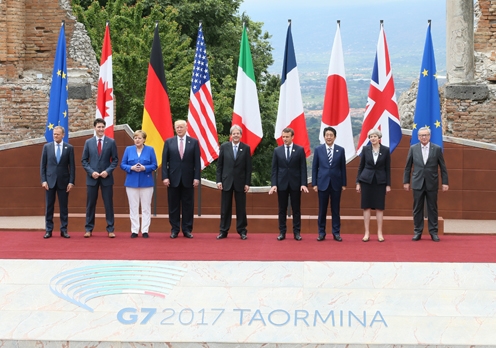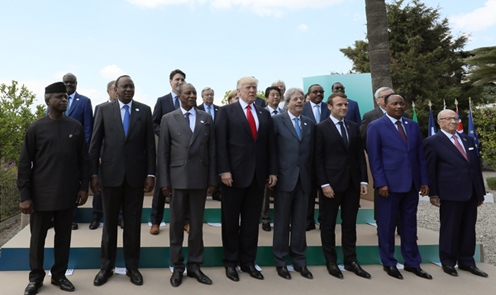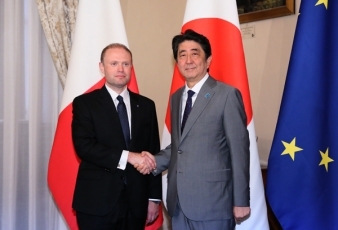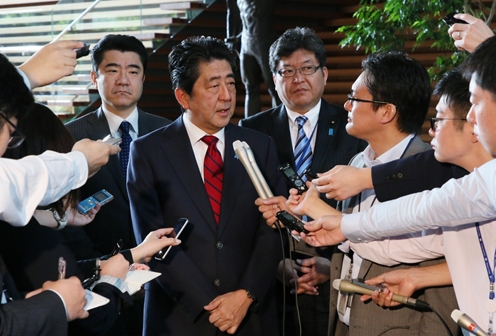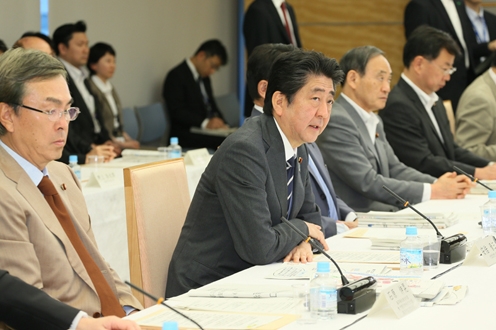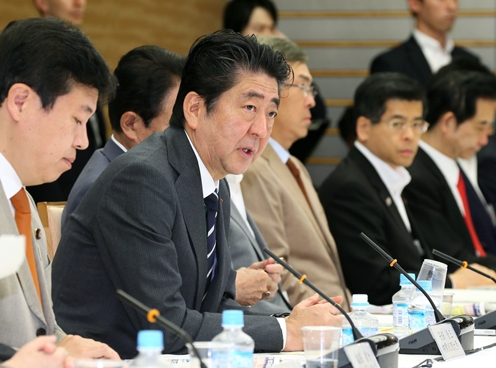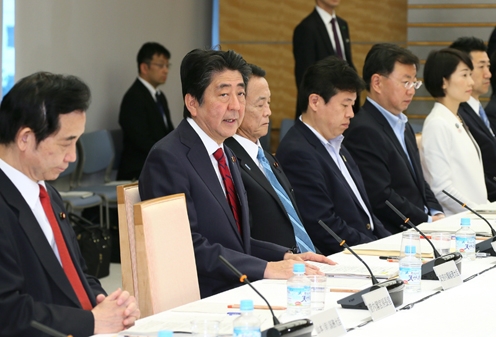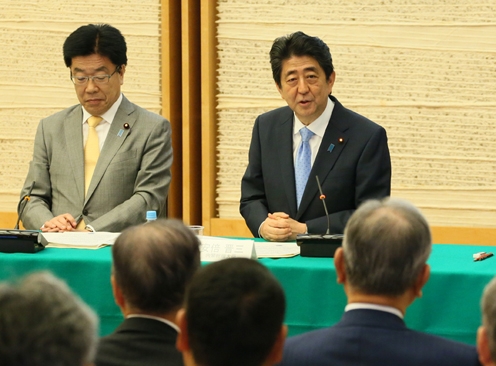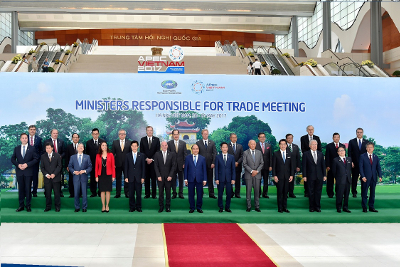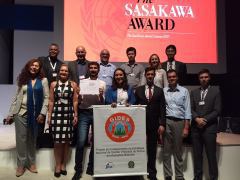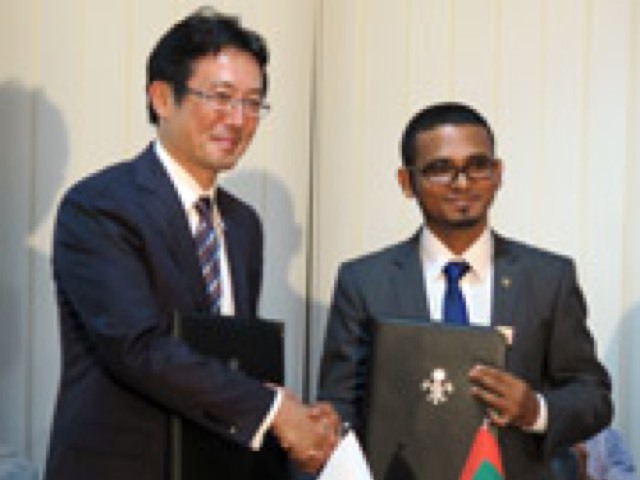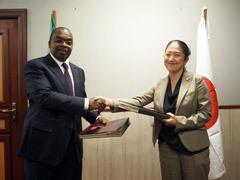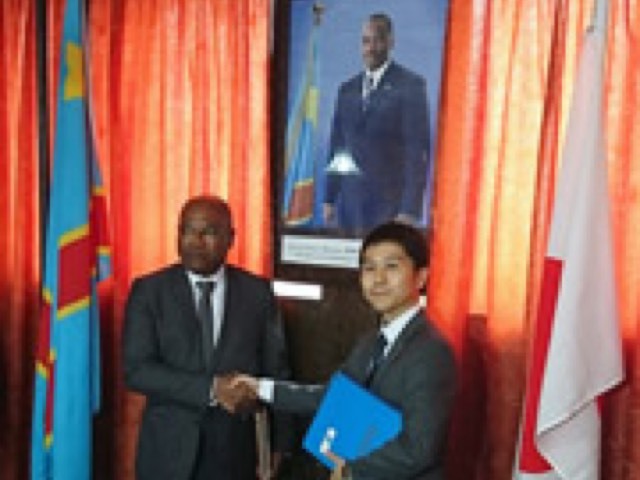G7 Taormina Summit: First Day
Cabinet Secretariat, Friday, May 26, 2017
[Provisional Translation]
On May 25 (local time), Prime Minister Shinzo Abe visited the Italian Republic to attend the G7 Taormina Summit.
The following day, May 26 (local time), Prime Minister Abe was welcomed by H.E. Mr. Paolo Gentiloni, President of the Council of Ministers of the Italian Republic. Afterwards, the Prime Minister participated in a photograph session, attended a cocktail party, and then watched an aerial show.
Later, the Prime Minister attended Session 1 (working lunch) on "Foreign Policy and Security Issues," and the leaders issued the G7 Taormina Statement on the Fight Against Terrorism and Violent Extremism. Following that, the Prime Minister attended Session 2, also on "Foreign Policy and Security Issues," and Session 3 on "World Economy and Sustainable Growth (Trade - Climate & Energy)."
In addition, Prime Minister Abe held talks, respectively, with the Honorable Donald Trump, President of the United States of America; H.E. Mr. Donald Tusk, President of the European Council and H.E. Mr. Jean-Claude Juncker, President of the European Commission; and H.E. Mr. Emmanuel Macron, President of the French Republic.
In the evening, Prime Minister Abe listened to a concert by La Scala Philharmonic Orchestra of Milan.
G7 Taormina Summit: Second Day
Cabinet Secretariat, Saturday, May 27, 2017
On May 27 (local time), Prime Minister Shinzo Abe, who is visiting the Italian Republic to attend the G7 Taormina Summit, attended Session 4 (outreach session) on "Innovation and Development in Africa" and then participated in a photograph session with the leaders of the G7 members and invited outreach countries.
Later, the Prime Minister attended Session 5 on "Global Issues" (human mobility, food security, gender equality) and Session 6 (working lunch) on "G7 Global Relations" (maritime security, Ukraine and Russia).
Lastly, the Prime Minister held a press conference.
Japan-Malta Summit Meeting
Foreign Affairs, Saturday, May 27, 2017
On May 27, commencing at around 7:50 p.m. for approximately 50 minutes, Mr. Shinzo Abe, Prime Minister of Japan, who is visiting Malta, held a summit meeting with H.E. Dr. Joseph Muscat, Prime Minister of Malta. The overview of the meeting is as follows.
1. Bilateral relations and Japan-Europe cooperation
(1) Prime Minister Muscat stated that even though Malta was a small country in Europe, it stood out for its high economic growth and low unemployment rate. He stated that he would like to collaborate with Japan in areas such as technology and services, with a view on the North-African markets. In addition, Prime Minister Muscat referred to the present visit of Prime Minister Abe as a good opportunity to further develop such bilateral relations.
(2) Prime Minister Abe expressed his respect for Prime Minster Muscat’s leadership and stated he hoped that his visit would lead to the advancement of bilateral relations.
(3) Prime Minister Abe stated that he had prayed for the souls of the war dead of the Japanese Imperial Navy and expressed his hope to collaborate on consolidating the rule of law at sea, to which Prime Minister Muscat showed his concurrence.
(4) In addition, Prime Minster Abe stated that he supported a strong EU and expressed his appreciation for Malta’s efforts as the presidency of the EU. He also referred to the UK’s exit from the EU (Brexit) and the Japan-EU Economic Partnership Agreement (EPA).
(5) Prime Minister Muscat also stated that he aimed to reach an agreement in principle on the Japan-EU EPA as early as possible.
(6) H.E. Mr. Louis Grech, Deputy Prime Minister and Minister for European Affairs, explained in concrete details the basic policy of the EU in its negotiations of Brexit and stated that the EU would secure the external transparency of the negotiations.
2. Regional affairs
(1) The two leaders exchanged views about the situation in the East China Sea and South China Sea and shared the view that they would continue to work together closely to maintain the international order based on the rule of law.
(2) In addition, the two leaders shared the view that North Korea represented a new level of threat, and confirmed the importance of adopting a new United Nations Security Council resolution including strict measures against further provocative actions.
Prime Minister Abe Holds a Meeting with the Secretary-General of the United Nations
Foreign Affairs, Saturday, May 27, 2017
On May 27, commencing at 11:54 a.m. local time (6:54 p.m. Japan time) for approximately 10 minutes, Mr. Shinzo Abe, Prime Minister of Japan, who is visiting the Italian Republic to attend the G7 Taormina Summit, held a meeting with Mr. António Guterres, Secretary-General of the United Nations (UN).
To begin with, Prime Minister Abe mentioned that it is important to increase pressure on North Korea at this juncture, and that China’s role is the key. In response, Secretary-General Guterres condemned North Korea’s recent actions, explained that the UN Security Council (UNSC) possesses tools to increase pressure on North Korea and stated that he will raise the North Korean issue seriously among countries concerned. The two sides agreed that they will collaborate closely on issues of concern such as the abductions, nuclear and missile issues.
Additionally, Prime Minister Abe stated the importance of implementing the agreement between Japan and the Republic of Korea (ROK) on the issue of comfort women, and Secretary-General Guterres expressed his support for the agreement and welcomed it.
Furthermore, Prime Minister Abe described Japan’s efforts towards becoming a State Party to the United Nations Convention against Transnational Organized Crime. In this regard, Secretary-General Guterres explained that a Special Rapporteur of the Human Rights Council is an individual expert independent from the United Nations and his/her assertions do not necessarily reflect the consensus view of the United Nations.
Meeting between Prime Minister Abe and President of the Republic of Guinea Condé
Foreign Affairs, Saturday, May 27, 2017
On May 27, commencing at about 12:15 a.m. for approximately 10 minutes, Mr. Shinzo Abe, Prime Minister of Japan, who is visiting the Italian Republic to attend the G7 Taormina Summit, held a meeting with H.E. Prof. Alpha Condé, President of the Republic of Guinea, who attended the G7 Outreach Meeting. The overview of the meeting is as follows.
Prime Minister Abe offered his congratulations on President Condé’s appointment as this year’s Chairman of the African Union, and stated that he hopes to continue to strengthen the bilateral relationship, and hopes to cooperate with President Condé to advance the United Nations (UN) reform.
In response, President Condé expressed afresh his gratitude for the support extended by Japan thus far, and in particular the support from Japan at the time of the Ebola virus disease outbreak. Additionally, President Condé mentioned the public-private efforts amounting to approx.. 30 billion U.S. dollars that Prime Minister Abe announced at the Sixth Tokyo International Conference on African Development (TICAD VI) last year, and stated that he hopes to make concrete progress with a variety of cooperative projects in the future, including in the agricultural field.
At the end of the meeting Prime Minister Abe stated that he hopes to pursue support in the agricultural field based on successful examples in Africa, and explained that health is also a field Japan attaches importance to and Japan is prepared to continue to provide the necessary support.
Prime Minister Abe Holds a Meeting with the President of the Republic of Kenya
Foreign Affairs, Saturday, May 27, 2017
On Sunday, May 27, commencing at about 9:20 a.m. for approximately 10 minutes, Mr. Shinzo Abe, Prime Minister of Japan, who was visiting the Italian Republic to attend the G7 Taormina Summit, held a meeting with H.E. Mr. Uhuru Kenyatta, President of the Republic of Kenya, who attended the G7 Outreach Meeting. The overview of the meeting is as follows. (The meeting was attended on the Kenyan side by Ambassador Amina C. Mohamed, Cabinet Secretary for Foreign Affairs, and on the Japanese side by Mr. Koichi Hagiuda, Deputy Chief Cabinet Secretary.)
Prime Minister Abe stated that he was pleased to have guided the Sixth Tokyo International Conference on African Development (TICAD VI) in August last year to a success together with President Kenyatta, and he also congratulated Cabinet Secretary Amina on being awarded the Grand Cordon of the Order of the Rising Sun. Furthermore, Prime Minister Abe stated that he hoped to further strengthen cooperation in areas such as developing the Mombasa Special Economic Zone (SEZ) and the United Nations Security Council (UNSC) reform.
In response, President Kenyatta expressed gratitude for the decoration conferred on Cabinet Secretary Amina, and stated that he was sincerely delighted with the success of TICAD VI and Prime Minister Abe’s state visit to Kenya and was grateful for Japan’s continuous support with Kenya’s economic and social development including Mombasa SEZ development and the energy sector. President Kenyatta stated that he hoped to continue to work together with Japan in the international arena including the UN reform.
In addition, Prime Minister Abe and President Kenyatta exchanged views on regional affairs including South Sudan and North Korea.
G7 Taormina Leaders' Communiqué (PDF) (273KB)
Foreign Affairs, Saturday, May 27, 2017
Preamble
1. We, the Leaders of the G7, met in Taormina on May 26-27, 2017 to address, in a spirit of cooperation, the global
challenges we face today and to respond collectively to the greatest concerns of our citizens. Our common endeavor
is to build the foundations of renewed trust, both towards our governments and among our countries.
2. We are bound together by our shared values of freedom and democracy, peace, security, the rule of law, and
respect for human rights. We are determined to coordinate our efforts in promoting the rules-based international
order and global sustainable development. We are also convinced of the distinctive role of culture as an instrument
to promote dialogue among peoples.
3. Technological change and globalization have made a fundamental contribution to raising living standards across
the world over recent decades. However, their benefits have not been shared widely enough, contributing to
inequalities in many countries. Despite progress in recent decades, we are still far from making poverty history, from
reaching the “zero hunger” objective and from ensuring that future generations will enjoy justice and peace, as well
as a cleaner and safer environment, as envisaged, for example, by the 2030 Agenda for Sustainable Development.
4. Our citizens rightly demand quality education, decent jobs, greater access to economic opportunities, gender
equality, and a cleaner environment. They expect us to deal with increasing numbers of refugees and migrants, also
through stronger international cooperation. Furthermore, they ask for more secure lives and, in particular, to halt
the rise of terrorism and violent extremism, including its manifestation online.
5. Against this backdrop, we want to send a message of confidence in the future, ensuring that citizens’ needs are at
the center of our policies. As G7 Leaders, we intend to do so by engaging in a joint effort to seize all the opportunities
offered by an era of extraordinary change. We will strive to highlight the transformative power of culture, gender
equality, diversity and inclusion, education, science, technology and innovation in a collective endeavor involving
governments, civil society, the private sector, and ordinary citizens. To achieve this we must improve knowledge and
competences across all sectors and regions of our countries, by fostering innovation and new skills, by investing in
fields such as education and training, as well as health, with a view to boosting economic growth and to improving
people’s quality of life. We therefore pledge to take concrete actions to manage today’s risks and to transform
challenges into opportunities.
Foreign Policy Issues
6. We share the same interest in strengthening a rules-based international order that promotes peace among
nations, safeguards sovereignty, territorial integrity and political independence of all states and ensures the
protection of human rights. Our world needs our genuine commitment to the solution of conflicts that are affecting
millions of innocent people and disrupting development and the healthy growth of future generations.
7. We endorsed the Joint Communiqué, the Declaration on Responsible States Behavior in Cyberspace, and the
Statement on Non-Proliferation and Disarmament of the Foreign Ministers’ meeting in Lucca, and further discussed
issues and crises that are most seriously threatening the security and well-being of our citizens and global stability.
8. Six years into the Syrian war, the Syrian people have endured the most tremendous suffering. We believe that
there is an opportunity to bring this tragic crisis to an end. No effort should be spared to bring an end to the conflict
through an inclusive Syrian-led political process under the auspices of the UN to implement a genuine credible
transition in accordance with UN Security Council Resolution 2254 and the Geneva Communiqué. We are determined
to increase our efforts to defeat international terrorism in Syria, in particular ISIS/ISIL/Da’esh and al Qaeda. Indeed, it
will be impossible to defeat terrorism without a political settlement. All major stakeholders must live up to their
international responsibilities. Those with influence over the Syrian regime, in particular Russia and Iran, must do their
utmost to use that influence to stop this tragedy, beginning with the enforcement of a real ceasefire, stopping the
use of chemical weapons, ensuring safe, immediate and unhindered humanitarian access to all people in need, and
releasing any arbitrarily detained persons, as well as allowing free access to its prisons. To this end, we hope that the
Astana agreement can contribute effectively to de-escalating violence. If Russia is prepared to use its influence
2
positively, then we are prepared to work with it in resolving the conflict in Syria, pursuing a political settlement. We
are prepared to contribute to the costs of reconstruction, once a credible political transition is firmly underway. We
will not engage in stabilization efforts that will support social and demographic engineering.
9. We reiterate our deepest concerns regarding the use of chemical weapons in Syria and reaffirm our strong
condemnation of the use of chemical weapons anywhere, at any time, by anyone, under any circumstances. Those
individuals, entities, groups or governments responsible for such use must be held accountable.
10. In Libya, it is urgent to advance on the path of inclusive political dialogue and national reconciliation. We
welcome the recent meetings between key Libyan players. All Libyans must engage with a spirit of compromise and
desist from actions that would fuel further conflict. While warning against the temptation of military settlements of
the situation, we reiterate our full support for the institutional framework laid out in the Libyan Political Agreement
(LPA) as the framework within which political solutions can be found, including possible adjustments to the LPA that
may advance reconciliation. We support the UN Support Mission in Libya (UNSMIL) mediation effort. We also
support the Presidency Council and the Government of National Accord in their effort to consolidate State
institutions, alleviate human suffering, protect and expand infrastructure, strengthen and diversify the economy,
manage migration flows and eradicate the terrorist threat.
11. We have made significant progress in reducing the presence of ISIS/ISIL/Da’esh in Syria and Iraq, and in
diminishing its appeal. We commit to continuing these efforts in order to complete the liberation of ISIS/ISIL/Da’eshheld
territories, in particular Mosul and Raqqa, in the pursuit of ISIS/ISIL/Da’esh’s final destruction and the end of
associated violence, widespread abuses of human rights and violations of international humanitarian law. Those who
have perpetrated crimes in the name of ISIS/ISIL/Da’esh, including the use of chemical weapons, must be held to
account. We welcome progress in countering ISIS/ISIL/Da’esh in Libya. We call upon all countries of the region to
play a constructive role by contributing to efforts to achieve inclusive political solutions, reconciliation, and peace,
which are the only way to eradicate ISIS/ISIL/Da’esh, other terrorist groups and violent extremism in the long-term in
Iraq, Syria, Yemen, and beyond.
12. We reiterate our commitment on non-proliferation and disarmament. North Korea, a top priority in the
international agenda, increasingly poses new levels of threat of a grave nature to international peace and stability
and the non-proliferation regime through its repeated and ongoing breaches of international law. North Korea must
immediately and fully comply with all relevant UN Security Council Resolutions (UNSCRs) and abandon all nuclear
and ballistic missile programs in a complete, verifiable and irreversible manner. Condemning in the strongest terms
North Korea’s nuclear tests and ballistic missile launches, we stand ready to strengthen measures aimed at achieving
these objectives and strongly call on the international community to redouble its efforts to ensure the sustained,
comprehensive and thorough implementation of relevant UNSCRs. We urge North Korea to address humanitarian
and human rights concerns, including the immediate resolution of the abductions issue.
13. A sustainable solution to the crisis in Ukraine can only be reached with the full implementation by all sides of
their commitments under the Minsk Agreements. We support the endeavors of the Normandy group and commend
the multifaceted commitment of the OSCE in order to de-escalate the crisis. We stress the responsibility of the
Russian Federation for the conflict and underline the role it needs to play to restore peace and stability. We reiterate
our condemnation of the illegal annexation of the Crimean peninsula, reaffirm our policy of non-recognition, and
fully support Ukraine’s independence, territorial integrity and sovereignty. We recall that the duration of sanctions is
clearly linked to Russia’s complete implementation of its commitments in the Minsk Agreements and respect for
Ukraine’s sovereignty. Sanctions can be rolled back when Russia meets its commitments. However, we also stand
ready to take further restrictive measures in order to increase costs on Russia should its actions so require. We
maintain our commitment to assisting Ukraine in implementing its ambitious and yet necessary reform agenda and
commend Kiev for its progress to date. Despite our differences with Russia, we are willing to engage with Russia to
address regional crises and common challenges when it is in our interest.
3
14. We reaffirm our commitment to maintaining a rules-based order in the maritime domain based on the principles
of international law, including as reflected in the United Nations Convention on the Law of the Sea (UNCLOS), and to
the peaceful settlement of maritime disputes through diplomatic and legal means, including arbitration. We remain
concerned about the situation in the East and South China Seas and strongly opposed to any unilateral actions that
could increase tensions. We urge all parties to pursue demilitarization of disputed features.
15. The recent cyber attacks hitting critical infrastructures worldwide reinforce our commitment to increased
international cooperation to protect an accessible, open, interoperable, reliable and secure cyberspace and its vast
benefits for economic growth and prosperity. We will work together and with other partners to tackle cyber attacks
and mitigate their impact on our critical infrastructures and the well-being of our societies.
Global Economy
16. Global recovery is gaining momentum, yet growth remains moderate and GDP is still below potential in many
countries, with the balance of risks tilted to the downside. Our top priority is to raise global growth to deliver higher
living standards and quality jobs. To this end, we reaffirm our commitment to use all policy tools – monetary, fiscal
and structural – individually and collectively to achieve strong, sustainable, balanced and inclusive growth. In
particular, monetary policy should continue to support economic activity and ensure price stability, consistently with
central banks’ mandate. We concur that fiscal policy should be used flexibly to strengthen growth and job creation,
while also enhancing inclusiveness and ensuring that debt as a share of GDP is on a sustainable path. In doing so, we
agree on the importance of improving the quality of public finances, including by prioritizing high-quality investment,
such as in infrastructures. We remain committed to advancing structural reforms to boost productivity and potential
output, while ensuring these are appropriately coordinated with macroeconomic policies. We reaffirm our existing
G7 exchange rate commitments, as agreed upon by Finance Ministers and Central Bank Governors at their meeting
in Bari. We will strive to reduce excessive global imbalances and in a way that supports global growth. We commit to
tackling all forms of corruption and tax evasion, as a means of reinforcing public trust in governments and fostering
sustainable global growth.
Inequalities
17. We welcome the “Bari Policy Agenda on Growth and Inequalities” adopted by G7 Finance Ministers and Central
Bank Governors as a framework to foster inclusive growth through a broad menu of policy options. We acknowledge
that inequalities – not just in income, but in all their forms – represent a major source of concern. In fact, excessive
inequality, also at the global level, undermines confidence and limits future growth potential. Furthermore,
inequality may contribute to regional disparities within countries and undermine intergenerational mobility, while
jeopardizing social cohesion and putting stress on institutions. In this respect, we will strive to strengthen the
capabilities and resilience of our economies and communities to adjust to the pace of change, so that the global
economy works for everyone.
Gender Equality
18. Gender equality is fundamental for the fulfillment of human rights and a top priority for us, as women and girls
are powerful agents for change. Promoting their empowerment and closing the gender gap is not only right, but also
smart for our economies, and a crucial contribution to progress towards sustainable development. Women and girls
face high rates of discrimination, harassment, and violence and other human rights violations and abuses. Although
girls and women today are better educated than ever before, they are still more likely to be employed in low-skilled
and low-paying jobs, carry most of the burden of unpaid care and domestic work, and their participation and
leadership in private and public life as well as their access to economic opportunities remains uneven. Increasing
women’s involvement in the economy – such as by closing the gender gaps in credit and entrepreneurship and by
enhancing women’s access to capital, networks and markets – can have dramatically positive economic impacts. We,
as the G7, have undertaken significant measures to tackle gender inequality, but more needs to be done. We
therefore remain committed to mainstreaming gender equality into all our policies. We welcome the important
4
contribution provided by the W7. To foster the economic empowerment of women and girls, we have furthermore
adopted the first “G7 Roadmap for a Gender-Responsive Economic Environment”.
Trade
19. We acknowledge that free, fair and mutually beneficial trade and investment, while creating reciprocal benefits,
are key engines for growth and job creation. Therefore, we reiterate our commitment to keep our markets open and
to fight protectionism, while standing firm against all unfair trade practices. At the same time, we acknowledge that
trade has not always worked to the benefit of everyone. For this reason, we commit to adopting appropriate policies
so that all firms and citizens can make the most of opportunities offered by the global economy.
20. We push for the removal of all trade-distorting practices – including dumping, discriminatory non-tariff barriers,
forced technology transfers, subsidies and other support by governments and related institutions that distort
markets – so as to foster a truly level playing field. We commit to further strengthening our cooperation and to
working with our partners in order to address global excess capacity in the steel, aluminum and other key industrial
sectors and to avoid its emergence in other areas. In this sense, we view with concern market-distorting measures
targeted at promoting key technologies. To this end, we welcome the Global Forum on Steel Excess Capacity,
established by the G20 and facilitated by the OECD, and urge all Members to promptly deliver on effective policy
solutions that enhance market function and adjustment in order to address the root causes of global steel excess
capacity. We also call on the International Working Group on Export Credits to develop new guidelines for publicly
supported export finance.
21. We recognize the importance of the rules-based international trading system. We commit to working together to
improve the functioning of the WTO, to ensure full and transparent implementation and effective and timely
enforcement of all WTO rules by all Members and to achieve a successful 11th WTO Ministerial Conference.
22. We commit to striving for better application and promotion of internationally recognized social, labor, safety, tax
cooperation and environmental standards throughout the global economy and its supply chains.
23. Finally, we recognize that international investment too can play an important role in sustaining growth and job
creation, and therefore strive to foster a predictable environment so as to facilitate foreign direct investment.
Human Mobility
24. The ongoing large-scale movement of migrants and refugees is a global trend that, given its implications for
security and human rights, calls for coordinated efforts at the national and international level. We recognize that the
management and control of migrant flows – while taking into account the distinction between refugees and migrants
– requires both an emergency approach and a long-term one. We also recognize the need to support refugees as
close to their home countries as possible, and enable them to return safely to and help rebuild their home
communities. At the same time, while upholding the human rights of all migrants and refugees, we reaffirm the
sovereign rights of states, individually and collectively, to control their own borders and to establish policies in their
own national interest and national security.
25. We agree to establish partnerships to help countries create the conditions within their own borders that address
the drivers of migration, as this is the best long-term solution to these challenges. We also acknowledge that states
share a responsibility in managing the flows; in protecting refugees and migrants, and safeguarding the most
vulnerable of them, such as women at risk, adolescents, children and unaccompanied minors; and in enforcing
border control, establishing returns schemes and enhancing law enforcement cooperation. These are essential
instruments to reduce irregular or illegal migration and to fight migrant smuggling, human trafficking and
exploitation, and all forms of slavery, including modern slavery. In this manner, we will safeguard the value of the
positive aspects of a safe, orderly and regular migration, since properly managed flows can bring economic and social
benefits to countries of both origin and destination as well as to migrants and refugees themselves.
5
Africa
26. Africa’s security, stability and sustainable development are high priorities for us. Our goal is indeed to strengthen
cooperation and dialogue with African countries and regional organizations to develop African capacity in order to
better prevent, respond to and manage crises and conflicts, as regards the relevant goals of the 2030 Agenda for
Sustainable Development. A stable Africa means a stable environment for investment. In this regard, we note the
forthcoming launch by the EU of the External Investment Plan (EIP) as an important tool to boost investment in the
continent, as well as the envisaged G20 Partnership Initiative with Africa and the investment pledge made at the
Tokyo International Conference for African Development (TICADVI). It is also important to continue our efforts to
expand reliable access to energy in Africa. Unlocking Africa’s potential requires empowering millions of people
through innovation, education, promoting gender equality and human capital development. Decent employment,
better health services, and food security will also contribute to building a more resilient society in a rapidly changing
world. We aim to work in partnership with the African continent, supporting the African Union Agenda 2063, in order
to provide the young generation in particular with adequate skills, quality infrastructures, financial resources, and
access to a sustainable, prosperous and safe future. Such advances also promise to help reduce migratory pressure,
relieve humanitarian emergencies and create socio-economic opportunities for all.
Food Security and Nutrition
27. Ending hunger, achieving food security and improved nutrition, and promoting sustainable agriculture is a crucial
goal for the G7. We reaffirm our collective aim to lift 500 million people in developing countries out of hunger and
malnutrition by 2030, as part of a broader effort involving our partners and international actors.
28. We are deeply concerned about the devastating levels of food insecurity, fueled by conflicts and instability,
already resulting in famine in parts of South Sudan and in the serious risk of famine in Somalia, Yemen and
northeastern Nigeria and critically affecting more than 20 million people. We strongly support the UNSG call for
urgent action. We are rapidly mobilizing humanitarian assistance, we will continue to support political processes
addressing the underlying causes of the crises and we are committed to strengthening the international
humanitarian system to prevent, mitigate and better prepare for future crises, while strengthening engagement to
build resilience.
29. While stressing the global dimension of the food insecurity and malnutrition challenge, we recognize that urgent
action is needed in Sub-Saharan Africa, the region with the highest percentage of undernourished people, deep rural
and urban poverty and particularly large movements of people, and where more than two-thirds of the Least
Developed Countries are located.
30. We have therefore decided to raise our collective support for food security, nutrition and sustainable agriculture
in Sub-Saharan Africa through an array of possible actions, such as increasing Official Development Assistance, better
targeting and measuring our respective interventions in line with the food security and nutrition-related
recommendations defined at Elmau and Ise-Shima, and ensuring they reach women and girls, backing efforts to
attract responsible private investments and additional resources from other development stakeholders. We will
encourage blended finance and public-private partnerships (PPPs). We will act in line with African countries’
priorities and consistently with the African Union Agenda 2063, aiming to reach also the most neglected areas and
the most vulnerable people.
Climate and Energy
31. We commit to strengthening our collective energy security and to ensuring open, transparent, liquid and secure
global markets for energy resources and technologies. We reaffirm that all countries that opt to use nuclear power
must ensure the highest standards of nuclear safety, security and non-proliferation. We are determined to harness
the significant economic opportunities, in terms of growth and job creation, offered by the transformation of the
energy sector and clean technology.
6
32. The United States of America is in the process of reviewing its policies on climate change and on the Paris
Agreement and thus is not in a position to join the consensus on these topics. Understanding this process, the Heads
of State and of Government of Canada, France, Germany, Italy, Japan, and the United Kingdom and the Presidents of
the European Council and of the European Commission reaffirm their strong commitment to swiftly implement the
Paris Agreement, as previously stated at the Ise-Shima Summit.
33. In this context, we all agree on the importance of supporting developing countries.
Innovation, Skills and Labor
34. The Next Production Revolution (NPR) offers an extraordinary opportunity to increase competitiveness and to
boost an innovation-driven growth. By reshaping our existing production systems, the NPR can indeed allow all firms
– including micro, small and medium-sized enterprises (MSMEs) – and help people across all sectors and regions to
reap the benefits of innovation and digitalization and enhance women’s opportunities to pursue STEM careers.
35. At the same time, the advance of automation and of emerging technologies, while they contribute to innovation
and economic growth, presents us with challenges and significantly changes the future of work. We have a
responsibility to face these challenges by managing the related risks of the NPR and of the ongoing transition, and to
rethink the future of work and of education – also through strong collaboration with stakeholders – so as to ensure a
transition that works for all. Our education systems and working styles must be adapted, based on national
circumstances. Companies and social partners should be closely involved and commit to new engagement in both
initial and lifelong education and training. We also need to address new forms of work and improve working
conditions by implementing sound labor market policies and by making adjustments to our welfare systems, when
necessary, in a multi-stakeholder approach, so as to provide stability for our labor force.
36. For these reasons, we have adopted a “G7 People-Centered Action Plan on Innovation, Skills and Labor”.
Elaborated with the support of the OECD and the ILO, it outlines a set of potential policy recommendations to
maximize the benefits of the NPR, to be further developed by our relevant Ministers during their upcoming
Ministerial Meetings.
37. In addition, in order to facilitate dialogue with key stakeholders and to provide the G7 with first-hand insights on
innovation issues, we have set up a “Strategic Advisory Board to G7 Leaders on People-Centered Innovation” (I-7).
The group’s first meeting is to take place during the “G7 Innovation Week” in Turin.
Health
38. We are committed to advancing global health security and pursuing policies that advance physical and mental
health improvements across the globe. Healthy lives and well-being are important to broader economic, social and
security gains. We recognize that women’s and adolescents’ health and healthcare must be promoted. We
acknowledge the role of environmental factors in affecting human health. We remain committed to strengthening
health systems, preparedness for, and a prompt, effective and coordinated response to public health emergencies
and long-term challenges. On this basis, we have asked our Health Ministers to follow up on these issues during their
November meeting.
Conclusion
39. We look forward to meeting under the Presidency of Canada in 2018.
Press Occasion on North Korea’s Missile Launch
Cabinet Secretariat, Monday, May 29, 2017
[Provisional Translation]
Prime Minister Shinzo Abe held a press occasion at the Prime Minister's Office.
In regard to North Korea's missile launch, the Prime Minister said,
"North Korea's continued acts of provocation, ignoring the repeated warnings of the international community, are absolutely unacceptable. Japan has lodged a strong protest against North Korea.
As agreed at the recent G7 Summit, the issue of North Korea is a top priority of the international community. Together with the United States, we will take concrete actions to deter North Korea.
Furthermore, we will continue to maintain a high level of vigilance, while coordinating with the international community, including the Republic of Korea, and take all necessary measures to ensure the safety of the people."
Council on Investments for the Future
Cabinet Secretariat, Tuesday, May 30, 2017
[Provisional Translation]
Prime Minister Shinzo Abe held the ninth meeting of the Council on Investments for the Future at the Prime Minister's Office.
At the meeting, discussion took place on the Investments for the Future Strategy 2017.
Based on the discussion, the Prime Minister said,
"Japan, which is faced with its declining birthrate and aging population, can fully utilize artificial intelligence, the Internet of Things (IoT), robots, and so on without fearing unemployment problems. Japan has strong "monozukuri" (manufacturing), and abundant data related to medical and nursing care as well as factories.
This opportunity should not be limited to industrial reform. Japan will incorporate new technologies into all kinds of industries and daily life, and be the first in the world to realize Society 5.0, which will resolve social challenges in a manner that meets each person's individual needs.
Firstly, we will focus the investment of government resources into strategic fields that utilize our strengths. We will advance initiatives centered on five fields that include extending healthy life expectancy and realizing the mobility revolution.
Secondly, we will build data platforms for inter-connected utilization of data across different fields. We will thoroughly open up public data in fields that have high private-sector needs.
Thirdly, focused on measures such as support for individual-focused adult education, we will intensively strengthen the IT skills of citizens.
Fourthly, we will introduce a regulatory sandbox system that makes trial and error possible, limited to certain participants and time periods. We will inject the spirit of trying out new ideas into our policies.
Fifthly, we will link these measures to a wide range of regions, companies, people, and tourism resources, and enrich the regional economies.
I would like the relevant ministers, led by Minister Ishihara, to advance adjustments with the ruling parties based on the draft proposed today, and formulate the new Growth Strategy."
Joint Meeting of the Strategic Headquarters for the Promotion of an Advanced Information and Telecommunications Network Society (IT Strategic Headquarters) and the Strategic Council for the Promotion of the Use of Public Data by the Private Sector
Cabinet Secretariat, Tuesday, May 30, 2017
[Provisional Translation]
Prime Minister Shinzo Abe jointly held the 71st meeting of the Strategic Headquarters for the Promotion of an Advanced Information and Telecommunications Network Society (IT Strategic Headquarters), and the 2nd meeting of the Strategic Council for the Promotion of the Use of Public Data by the Private Sector, at the Prime Minister's Office.
During the meeting, there were exchanges of opinions on the Declaration on the Creation of the World's Most Advanced IT Nation and the Basic Plan for the Promotion of the Use of Public Data by the Private Sector, the Policy for the Promotion of Digital Government, the Public-Private ITS Concept and Roadmap 2017, and the Basic Policy on Open Data.
Based on the exchanges of opinions, the Prime Minister said,
"Toward the realization of Society 5.0, which overcomes the challenges of the declining birthrate and aging population through technological innovation, the IT Strategic Headquarters and the Strategic Council for the Promotion of the Use of Public Data by the Private Sector are working for the complete utilization of IT, in particular, the utilization of big data in a variety of fields.
We will identify the priority fields to accommodate the needs of the private sector, and will realize data collaboration across different fields during a focused period for initiatives lasting until 2020.
In the medical field, two billion health insurance claims are assessed per year, and currently assessment rules vary across the regions. By advancing the unification and public release of these rules, the assessment process can be simplified. We will fundamentally review the assessment process and system, and reduce the deficit by almost 40 billion yen by making the procedures more efficient.
In order to improve the transparency of the real estate market, we will make information openly available on transaction prices and the current state of utilization of buildings, and on regional safety and infrastructure and other matters. By developing databases that are inter-connected with other information such as household registration and the Basic Resident Register, and gaining and sharing the latest information on ownership, we will facilitate measures to address the issue of empty homes, development work, and other matters. Through such measures, we will activate real estate business dealings and expand the real estate investment market to approximately 30 trillion yen.
Toward ensuring the realization of these measures, I would like all the ministers to work as one under the IT Strategic Headquarters and the Strategic Council for the Promotion of the Use of Public Data by the Private Sector."
Council on Overcoming Population Decline and Vitalizing Local Economy
Cabinet Secretariat, Monday, May 29, 2017
[Provisional Translation]
Prime Minister Shinzo Abe held the 12th meeting of the Council on Overcoming Population Decline and Vitalizing Local Economy in Japan at the Prime Minister's Office.
During the meeting, opinions were exchanged on the Basic Policy for Overcoming Population Decline and Vitalizing Local Economy 2017.
Based on the exchange of opinions, the Prime Minister said,
"Thank you for discussing the draft Basic Policy for Overcoming Population Decline and Vitalizing Local Economy 2017 today.
In order to raise the average income in the regions, we will invest in human resources to improve productivity. To that end, we will offer prioritized support for advanced industry promotion and specialist training initiatives that regional universities are undertaking through industry-government-academia collaboration, with the heads of the regions exercising leadership.
As the population of 18-year-olds decreases significantly, we will further develop regional universities into places for industry promotion and practical education, taking advantage of the special characteristics of their regions. At the same time, to ensure that the student population is not overly concentrated only in Tokyo, we will establish a concrete system based on the principle of not increasing the student quota of universities in the 23 wards of Tokyo.
In addition, to increase the attractiveness of the towns and shopping areas in the regions, we will provide local economic vitalization grants and other assistance to offer prioritized support for initiatives to solve the issue of vacant shops. We will also consider creating a system that will not allow fixed asset tax exceptions for vacant shops, among other measures, and reach a conclusion by the end of the year.
The Abe administration will keep aiming to further accelerate regional vitalization, and will continue to offer its full support to municipalities driven to vitalize their economies. Based on today's discussion, I would like to ask Minister in charge of Regional Revitalization Yamamoto to lead the efforts in compiling the Basic Policy."
Council on the Promotion of the National Movement to Improve Productivity
Cabinet Secretariat, Wednesday, May 24, 2017
[Provisional Translation]
Prime Minister Shinzo Abe held the first meeting of the Council on the Promotion of the National Movement to Improve Productivity at the Prime Minister's Office.
At the meeting, reports were given on initiatives for the improvement of productivity.
The Prime Minister said in his opening address,
"Today, from all corners of Japan, business owners who are busy with management on a day-to-day basis together with representatives of business organizations have gathered here in order to promote an all-Japan effort to improve productivity.
Thanks to Abenomics, major improvements have been achieved related to corporate earnings and employment, and nominal GDP has reached its highest level ever. This year's spring employer-employee negotiations saw the continuation of the wage hike trends of the previous three years, with many companies raising wages across the board for the fourth consecutive year.
On the other hand, with the economic recovery brought about by Abenomics, overcoming personnel shortages has become a major issue for business owners. I think this is difficult for small businesses, those in the service industry, and people involved in the management of companies in the regions. The only way to overcome this issue is to improve labor productivity.
In addition, in cooperation with management and labor representatives, the Government is now promoting work style reform, including placing restraints on the practice of long working hours. In order to alleviate personnel shortages by making workplaces attractive, we must move forward with work style reform. On the other hand, as I have heard from SME groups, we must advance reforms for productivity improvements for this purpose as well.
All of you were gathered here at the Prime Minister's Office two years ago. Since then, you have been working for productivity improvements. Today, I would like to hear your reports about the initiatives you have all implemented over the past two years.
Today, the Abe administration is establishing the Council on the Promotion of the National Movement to Improve Productivity. We will undertake in a unified manner work style reforms as well as reforms for productivity improvements and reforms to foster personnel. I would like to request everyone's cooperation with this."
In addition, lastly, based on the day's reports, the Prime Minister said,
"I would like to first express my gratitude to the advisers, including advisors from Toyota Motor Corporation and Canon Inc., who cooperated with our case study research at 67 companies across Japan, as well as the managers of the companies that accepted the advisors. We will prepare certificates of participation today for everyone who participated.
It was the movement for productivity increases in the manufacturing industry, symbolized by kaizen (continuous improvement) activities, that led Japan's high-speed economic growth after World War II.
The need for raising productivity in labor intensive industries has been pointed out for many years, but efforts have not been very successful up to this point. Today, however, we have confirmed that if we implement initiatives like the ones contained in this report, sales will rise visibly, the burdens placed on employees will shrink, and productivity will improve.
Toyota undertook helping to reduce the production failure rate of fried tofu, and Canon helped to streamline the cutting and wrapping of cabbages. I suppose that the companies accepting advisers may have felt somewhat that the work of the advisers was not related to their own, or wondered if an automobile maker really knew about food. I would like to express my gratitude to everyone who overcame these barriers and accepted advisers with the strong will to improve productivity. I also want to communicate my gratitude to everyone who accepted appropriate advice.
Today, I have been able to see for myself how to undertake productivity improvements, and what kind of results can be produced. I believe that everyone gathered here has also become convinced that productivity can be improved even at small regional businesses. I think it has become clear from today's presentations that the manufacturing industry and the service industry are not different.
I look forward to the reports at the next meeting on effective initiatives in the truck transport segment, the lodging segment, and the nursing care segment.
I do not want all of this to be limited to five segments. I would like to consider expansion to other manufacturing segments confronting personnel shortages as well. To that end, we will make all-Government actions for the productivity improvement movement. Through productivity improvements, burdens placed on workers will decrease, while at the same time sales will increase and wages will rise. As these initiatives will make everyone happy, I absolutely want to promote them. I myself will take the lead on the development of this Council on the Promotion of the National Movement to Improve Productivity. Let's work together and give our utmost efforts."
METI Minister Seko Visits the Socialist Republic of Viet Nam
Foreign Affairs, Tuesday, May 23, 2017
From May 19 (Fri.) to 23 (Tue.), 2017, Mr. Hiroshige Seko, Minister of Economy, Trade and Industry, visited Hanoi, the Socialist Republic of Viet Nam, to attend the Meeting of the Asia-Pacific Economic Cooperation (APEC) Ministers Responsible for Trade and also the Regional Comprehensive Economic Partnership (RCEP) Intersessional Ministerial Meeting. Taking the opportunity of these meetings, Minister Seko held bilateral meetings with the following ministers and dignitaries: H.E. Mr. Nguyen Xuan Phuc, Prime Minister, H.E. Tran Tuan Anh, Minister of Industry and Trade, and H.E. Mr. Nguyen Van Binh, Chairman, Central Economic Commission of the Communist Party, Viet Nam; H.E. Mr. Robert Emmet Lighthizer, United States Trade Representative; H.E. Mr. Francois-Philippe Champagne, Minister of International Trade, Canada; H.E. Mr. Ildefonso Guajardo Villarreal, Secretary of Economy, Mexico; H.E. Mr. Maksim Stanislavovich Oreshkin, Minister of Economic Development, Russia; H.E. Mr. Steven Ciobo, Minister for Trade, Tourism and Investment, Australia; H.E. Mr. Todd McClay, Minister of Trade, New Zealand; H.E. Ramon M. Lopez, Secretary of Trade and Industry, the Philippines; H.E. Mr. Enggartiasto Lukita, Minister of Trade, Indonesia; and H.E. Ms. Khemmani Pholsena, Minister of Industry and Commerce, Lao PDR.
1. APEC Ministers Responsible for Trade Meeting
Under the chairmanship of Minister Anh, Viet Nam, ministers responsible for trade from the economies in the Asia-Pacific region frankly exchanged views mainly on two themes: “Deepening Regional Economic Integration” and “Fostering Sustainable, Innovative and Inclusive Growth.” The Statement of the Chair includes; the importance of multilateral trading systems, the pledge against protectionism, correction of trade-distorting measures, ensuring of a level playing field, and other issues, in which Japan’s views are fully reflected.
At the meeting, Minister Seko made the following proposals and statements concerning APEC efforts, and many economies supported them.
Concerning the issue of deepening regional economic integration, Japan stated that APEC should open a new era for economic growth through trade, being back to its basics -restraining protectionism. Japan also proposed three future roles that APEC should play in the Asia-Pacific region: [i] developing high-level, free and fair trade and investment rules, [ii] promoting reforms by addressing trade-distorting measures and ensuring a level playing field, and [iii] providing opportunities for small entrepreneurs and SMEs to expand its business by participating in global value chains through trade. Building on these efforts, Japan further stated that APEC should pursue inclusive, innovation-oriented free trade in the region, where the economy is growing.
Concerning the issue of digital trade, Japan stated that the APEC should expand a new policy concept called “connected industries” across the region and enhance connections between a variety of industries in these economies. Japan continued to say that to this end, it is important for APEC to remove excessive regulations and develop an environment for facilitating free flow of information. As part of the efforts to achieve these goals, Japan informed that Japan and Viet Nam will jointly hold a seminar in August 2017 concerning the APEC Cross Border Privacy Rules System (CBPR).
Concerning the issue of Quality Infrastructure, Japan reported its progress on Peer Review and Capacity Building projects with the Philippines and Viet Nam. Furthermore, Japan also stated that to further develop the initiatives, it will launch a new initiative to update the APEC Guidebook on Quality of Infrastructure Development and Investment, e.g., developing practical methods and tools for securing the quality of infrastructures.
2. Summary of the Third RCEP Intersessional Ministerial Meeting
On May 21 and 22, 2017, the Third RCEP Intersessional Ministerial Meeting was held. The ministers were reported on the current state of overall negotiations, including rules and market access in goods, services and investment. Following this, they held discussions concerning future approaches to advancing these negotiations and other issues.
At the meeting, the ministers focused on approaches to deal with the two ideas: prioritizing the substantial conclusion of RCEP taking the opportunity of the milestone year of ASEAN’s 50th anniversary this year, and recognizing the importance of reaching agreement of a high-level and well-balanced agreement rather than maintaining a focus solely on its early conclusion.
Regarding this issue, Minister Seko proposed to other ministers that they collectively start initiatives to identify key elements that will contribute to well-balanced progress of overall negotiations not only in market access but also in rules, such as e-commerce, customs procedures, and countermeasures against pirated and counterfeit products, so as to make RCEP the new role model for a regional economic integration that is inclusive and innovation-oriented. The participating countries agreed on the proposal. The ministers agreed that they will instruct their chief negotiators to hold discussions on this proposal and to report on their discussions at the next RCEP ministerial meeting.
3. Bilateral meetings
1) Meeting with dignitaries of Viet Nam
At the meetings with each of Prime Minister Phuc and Minister Anh, Japan talked about the strong significance of preparatory processes for the APEC summit meeting to be held in November 2017 under the chairmanship of Viet Nam, due to the fact that the APEC economies are currently faced with significant ideological divides in discussing trade issues. Based on this, Japan confirmed its robust collaboration with Viet Nam. In addition, both sides exchanged their views on the trade issues in the Asia-Pacific region including TPP.
At the meeting with Chairman Binh, Central Economic Commissioner of the Communist Party, both sides frankly exchanged views concerning approaches to Japan-Viet Nam cooperation in contributing to the developing economy in the Asia-Pacific region, including Viet Nam and other ASEAN economies.
2) Meeting with United States Trade Representative Lighthizer
Both sides shared their interest in enhancement of Japan-US relationship in the fields of trade and the economy. Both sides also agreed to promote mutually beneficial trade, fight trade barriers and trade distorting measures, foster economic growth, and help establish high standards. In particular, both sides agreed on the enhancement of cooperation in addressing common concerns about unfair trade practices in other countries.
3) Meetings with Minister Guajardo, Mexico, and Minister Champagne, Canada
At each meeting, Japan talked about NAFTA renegotiation with Mexico and Canada respectively, and exchanged information on trends in the negotiations in Mexico and Canada, countries in which many Japanese companies are developing business in the automobile and other industries. Japan also exchanged views with each country concerning the trade issues in the Asia-Pacific region including TPP.
4) Meeting with Minister Oreshkin, Russia
Both sides agreed to close cooperation in further specifying the eight-point cooperation plan toward the summit meeting to be held taking the opportunity of the Eastern Economic Forum in September 2017. Moreover, they exchanged views concerning overall efforts for trade negotiations, including APEC.
5) Meetings with countries involved in TPP and RCEP
At each meeting, Minister Seko exchanged views with the following ministers concerning trends in trade issues in the Asia-Pacific region including RCEP and TPP: Minister Ciobo, Australia; Minister McClay, New Zealand; Minister Lukita, Indonesia; and Minister Khemmani, Lao PDR. Concerning the issue of RCEP in particular, Japan encouraged these ministers to pursue a well-balanced, and high-quality agreement in all negotiation areas, including rules.
Release date
May 23, 2017
Division in Charge
APEC Office, Economic Partnership Division, Americas Division & Europe Division of the Trade Policy Bureau
JICA’s Project for Strengthening National Strategy of Integrated Natural Disaster Risk Management in Brazil Receives the UN Sasakawa Award for Disaster Reduction
JICA, Thursday, June 01, 2017
On May 25, an ongoing project that JICA began in July 2013 in Brazil titled the “Project for Strengthening National Strategy of Integrated Natural Disaster Risk Management” was awarded the UN Sasakawa Award for Disaster Reduction at the Global Platform for Disaster Reduction sponsored by the United Nations in Cancún, Mexico.
The UN Sasakawa Award for Disaster Reduction was established by the Nippon Foundation and the United Nations more than three decades ago with the purpose of promoting the efforts of institutions and individuals to reduce the risks of natural disasters.
The project was awarded after a favorable evaluation of the project activities that include the creation of disaster-prevention and mitigation manuals tailored to the specific circumstances of Brazil, the strengthening of lateral coordination between the pertinent government agencies for integrated applications of landslide disaster prevention and mitigation measures. Many counterpart government officials and engineers in Brazil have joined Japanese experts in the project activities, including officials from the Ministry of Cities and the Ministry of National Integration at the federal level, and from Rio de Janeiro State and Petrópolis at the local level.
In 2011, the award was given to the Central American Coordination Center for Natural Disaster Prevention, the core cooperation partner of JICA’s Project on Capacity Development for Disaster Risk Management in Central America “BOSAI.”
It is hoped that, through this award, the importance of disaster risk reduction will become known in Brazil while raising awareness of disaster risk reduction.
Signing of Grant Agreement with Haiti: Constructing elementary and secondary school facilities and providing school furniture to contribute to improvements in basic education quality and access
JICA, Wednesday, May 17, 2017
On May 16, the Japan International Cooperation Agency (JICA) signed a grant agreement with the Government of the Republic of Haiti in Port-au-Prince, the capital city, to provide grant aid of up to 2.046 billion yen for the Project for Construction of Basic Schools in Centre and Artibonite Departments [1].
The project will construct facilities and provide school furniture for 13 elementary and secondary schools in Centre and Artibonite Departments in Haiti to improve the learning environment and contribute to improvements in the quality of and access to basic education.
Although the Government of Haiti has had success in a partially implemented free education program and the school enrollment ratio is rising, the level of education in Haiti remains one of the lowest in Latin America, and one factor behind that low ranking is a lack of classrooms. Another factor is overcrowding classes in excess of 100 students per classroom, making it impossible to provide a suitable learning environment and bringing about a low learning quality. Therefore, solving the lack of public schools and classrooms and improving the learning environment with expanded enrollment opportunities are priorities.
It is expected that the project will ensure a favorable learning environment and contribute to improved learning quality and higher rates of higher-level enrollment and grade promotion in Centre and Artibonite Departments, which have particularly low enrollment ratios and high classroom overcrowding even for Haiti.
In addition to the damage caused by the January 2010 earthquake, Haiti suffers from wind and flooding damage in annual hurricanes, and 96 percent of the designated evacuation shelters are schools. Taking into consideration the perspective of disaster risk reduction, the project will provide facilities and school furniture that can function for evacuation during disasters, and will improve awareness of disaster risk reduction among school faculty members and community residents.
1: “Le Projet de Construction d’Ecoles Fondamentales des Départements du Centre et de l’Artibonite” in French
[Basic project information]
Country Republic of Haiti
Project title The Project for Construction of Basic Schools in Centre and Artibonite Departments
Planned implementation period 24 months, including detailed design work and the bidding period
Executing agency Ministry of National Education and Professional Training, Centre and Artibonite Education Bureaus
Target region, facilities Centre Department—Boucan-Carré, Hinche, Mirebalais, Saut-d'Eau, Thomonde; Artibonite Department—Verrettes
Specific project details (provisional) (1) Facility improvements, equipment procurement
Additional classrooms and other facilities at 13 elementary and secondary schools
Facilities: classroom buildings, principal’s offices, faculty rooms, storerooms, lavatory buildings, solar power generation systems, lighting fixtures, electrical receptacles
Furniture and furnishings: Desks and chairs for students, teachers and principals, blackboards
(2) Consulting services
Detailed design work, bidding assistance, construction supervision, (as guidance) education and training in school facility maintenance and management, health and sanitation, disaster risk reduction education and training, other
Signing of Grant Agreement with the Maldives: Introducing Integrated Services Digital Broadcasting-Terrestrial television services to reduce information disparities and improve disaster-preparedness
JICA, Wednesday, May 31, 2017
On May 30, the Japan International Cooperation Agency (JICA) signed a grant agreement (G/A) with the Government of the Republic of Maldives to provide grant aid of up to 2.792 billion yen for assistance for the Project for the Digital Terrestrial Television Broadcasting Network Development.
This project will provide an Integrated Services Digital Broadcasting-Terrestrial (ISDB-T) television network throughout the Maldives, making information more accessible to residents and reducing information disparities among islands. This initiative will also advance the speedy communication of emergency warning information as a measure against climate change and to strengthen disaster preparedness.
In the Republic of Maldives, composed of some 1,190 atolls, public and private broadcasting companies has provided analog terrestrial television services, and with a coverage of 83.2 percent of the population, television is a primary means for residents to access information. However, as the private broadcasters provide service only to the capital island of Malé and its surrounding islands, there are information disparities among islands, a major challenge. To reduce such information disparities and improve access to information, an expansion in broadcasting services must be made by, for example, increasing the number of channels providing the local language programs in outlying islands. Additionally, building the infrastructure required to provide prompt and detailed meteorological and emergency warning information, such as evacuation instructions during an emergency, is a priority particularly because, as an island country, the Maldives has a high latent risk of natural disasters, such as hurricanes, flooding, and the rising sea levels caused by climate change. To address these issues, a digital terrestrial television network is needed that enables joint transmission (shared use of a radio transmission tower) by terrestrial broadcasters, channel multiplexing, and providing various types of data broadcasting, including emergency warning information.
This project will increase the terrestrial television coverage to at least 90 percent of the country’s population and increase the number of channels available on outlying islands from one to eight. These measures are expected to reduce the information disparities among islands, provide programs that reflect local needs, and improve access to meteorological and emergency warning information.
[Basic project information]
Country Republic of Maldives
Project title Project for the Digital Terrestrial Television Broadcasting Network Development
Planned implementation period 23 months, including detailed design work and the bidding period
Executing agency Public Service Media (PSM)
Target region, facilities The Maldives (nationwide)
Specific project details (provisional) 1) Public works and equipment to be procured
Digital terrestrial television platform: digital transmission system (18 digital transmission sites, three relay sites), network operation center equipment, PSM equipment, antenna towers/poles, measurement and maintenance equipment, procurement and installation of spare parts, 21 transmitting station buildings (25.0 square meters each)
2) Consulting services
Detailed design, bidding assistance, procurement management
Signing of Japanese ODA Loan Agreement with Cameroon: Improvement of a section of an international corridor connecting Central African countries and stimulating the sub-regional distribution of goods
JICA, Wednesday, May 31, 2017
On May 30, the Japan International Cooperation Agency (JICA) signed a loan agreement with the Government of the Republic of Cameroon in Yaoundé to provide a Japanese ODA loan of up to 5.894 billion yen for the Yaounde-Brazzaville International Corridor Development Project (Mintom-Lélé Section).
The project will develop approximately 67 kilometers of unpaved road between Mintom and Lélé in the south part of Cameroon, which makes up a part of the key international corridor in Central Africa that connects Yaoundé and Brazzaville, the capital cities of Cameroon and Republic of the Congo, as well as reaching Gabon and Equatorial Guinea. The objective of the project is to ensure an efficient transportation route between Cameroon and the Republic of the Congo, with the aim of promoting poverty reduction and economic development in the target region as well as the integration of the sub-regional economy of Central Africa. The loan funds will be allocated to public works procurement related to paving the target road section. The project will be co-financed by the African Development Bank (AfDB).
Located in the South Region, the target area produces foods, including agricultural products such as cassava, cooking bananas and cacao, which are exported to trading partners including Japan. The South Region also has a high potential for development as it is endowed with high-quality timber and minerals including iron ore. However, the poor conditions of the unpaved road along the Mintom-Lélé section make the domestic and external transportation of such products inefficient and costly, which has resulted in a lag in poverty reduction and economic development in the south.
Support for improvement of the Yaoundé-Brazzaville international corridor outside of the project target section is being provided by the AfDB, the Central African Development Bank [1] and other development partners, with the aim of promoting sub-regional economic integration by connecting the corridor from the Port of Douala in Cameroon, the largest regional logistics hub, to Brazzaville via Yaoundé with paved roads.
Through co-financing with the AfDB, JICA supports improvements of major trunk roads in Cameroon, including the Transport Facilitation Program for the Bamenda-Mamfe-Ekok/Mfum-Abakaliki-Enugu Corridor (loan agreement signed in March 2009) and the Batchenga-Lena Road Project (loan agreement signed in March 2015). Through such projects, JICA will continue to contribute to economic development in Cameroon and sub-regional integration in Central Africa.
1: Banque de Développement des États de l’Afrique Centrale
Project title Amount (million yen) Annual interest rate (%) Repayment
period
(years) Grace
period
(years) Procurement
Project Consulting services
Yaounde-Brazzaville International Corridor Development Project (Mintom-Lélé Section) 5,894 0.3 - 40 10 General untied
2. Executing Agency
Ministry of Public Works
Address: BP 15406 Yaoundé, Cameroon
Phone: +237-222-22-22-94, fax: N/A
3. Planned Implementation Schedule
(1) Completion of project: May 2021 – when the road is put into service
(2) Issuing of letters of invitation for consulting services: Not applicable
for this loan. Consulting services will be provided through financing from the AfDB.
(3) Tender announcement of initial procurement package for international competitive bidding on project construction:
Procurement package title: Civil Works
Release date: May 2016 (already released)
Signing of Grant Agreement with the Democratic Republic of the Congo: Contributing to the fight against infectious diseases
JICA, Monday, May 29, 2017
On May 26, the Japan International Cooperation Agency (JICA) signed a grant agreement with the Government of the Democratic Republic of the Congo (DRC) in Kinshasa to provide grant aid of up to 2.325 billion yen for the Project of Improvement of National Institute for Research and Biomedical.
The project will provide testing, research and training facilities and equipment to the National Institute for Research and Biomedical (INRB), the only national institution in the DRC established for the fights against infectious diseases.
The DRC has a weak healthcare system faced with challenges in its ability to provide medical services. Even today, the under-five mortality rate and the maternal mortality rate are high, at 98 per thousand births and 693 per 100,000 births (both 2015), respectively, and the country has experienced widespreadoutbreaks of Ebola hemorrhagic fever seven times. On May 13, the World Health Organization announced that an outbreak of Ebola hemorrhagic fever had been confirmed in the DRC, and addressing the situation is a priority.
As measures to fight infectious diseases, the INRB conducts testing and diagnoses along with basic research on multidrug-resistant tuberculosis, viral hemorrhagic fevers and other such diseases, while providing training opportunities to researchers and technicians. The INRB has also established a track record that includes joint research with the Institute of Tropical Medicine at Nagasaki University and the Noguchi Memorial Institute for Medical Research in Ghana as well as cooperative work with the Infectious Disease Response Team from JICA’s Japan disaster relief team (dispatched in August 2016).
In addition to the challenges that the healthcare system faces, the country has neither enough facilities for the diagnosis and research of cell cultures nor adequate training facilities for the human resources that handle infectious disease diagnosis and surveillance.* In particular, the lack of a safe environment including biosafety level 3 (BSL-3) laboratories puts the researchers at risk of pathogen infection and the like during the immunological testing and research. In order to further strengthen the initiatives to fight infectious diseases and train local experts, such facilities and equipment are required.
By expanding the facilities and installing equipment at the INRB, it is expected that this project will improve the environment for conducting diagnoses and basic research on tropical infectious diseases, while promoting the capacity building of medical professionals and researchers. It is also hoped that this project will make it possible to conduct testing and research that require a higher biosafety level.
In addition to this project, JICA supports the DRC in policy-making, reinforcement of the infectious disease surveillance system through the dispatch of experts to the Ministry of Public Health and training of the local mid-level medical providers, such as nurses and pharmacists, through technical cooperation projects and the construction of the National Pilot Institute for Health Science Education. Through these initiatives, JICA will continue to provide comprehensive support for strengthening the health system and fighting infectious diseases in the DRC.
* Data aggregation, analysis and information sharing of the infectious disease outbreaks to prevent epidemics.
[Basic project information]
Country Democratic Republic of the Congo
Project title The Project of Improvement of National Institute for Research and Biomedical
Planned implementation period 30 months, including detailed design work and the bidding period
Executing agency National Institute for Research and Biomedical
Target region, facilities National Institute for Research and Biomedical, Kinshasa Province
Specific project details (provisional) (1) Facility improvements, equipment procurement
Facilities
Testing and research center: 1,572 square meters with three BSL-2 and three BSL-3 laboratories (for bacteriology, virology and the treatment of animal specimens)
Training center: 1,349 square meters with two BSL-2 training rooms, a conference room and other facilities
Clinical trial center: 144 square meters
Equipment
Testing and research center: Biosafety cabinets, glove boxes, carbon dioxide incubators, sterilizers, other
Training center: Biosafety cabinets, microscopes, laboratory tables, other
Clinical trial center: Examination tables, patient beds, a drug storage cabinet, other
(2) Consulting services
Detailed design work, bidding assistance, construction and procurement supervision
As training and technical support, technical guidance for the operation and maintenance of air conditioning equipment, special equipment, and medical waste and wastewater disposal equipment for the BSL-2 and -3 laboratories

























